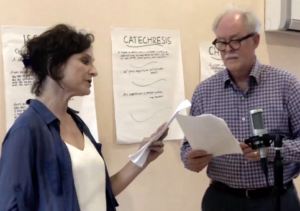
John Lithgow and Susan Angelo read Erasmus’ Colloquy, “Abattis et Eruditae”
It was the discovery of the Colloquia Familiaria written by Erasmus that got me started on my book ten years ago. I found a mention of them in a terrific biography of Shakespeare by Jonathan Bate, Soul of the Age, and found a dusty old copy on line. When I started reading, I was astonished to find early models of the colloquial characters that I loved as a kid watching Shakespeare’s plays: the clowns, shopkeepers, thieves, schoolmasters, bar flies, prostitutes, etc. These were short scripts written forty years before Shakespeare was born, for schoolboys, to teach conversational Latin! Just about every Latin grammar school in England had copies of the texts and scheduled the Colloquia in their statutes. To me it is glaringly obvious that, as a boy, Will Shakespeare performed them at school. Characters, circumstances, even specific images and lines show up all over his early comedies. I wondered why hardly anyone had ever seemed to notice.
Something else that amazed me were all of the whip-smart women characters that Erasmus created! Shakespeare is often noted for his luminous and opinionated women, often outsmarting and out-talking the men around them. Hello!? Erasmus’ women were doing that long before Shakespeare!
Much gratitude to the lovely Susan Angelo and my kid brother John Lithgow for this delightful cold reading of “Abattis et eruditae” at a salon I did recently at the home of my friend Susan Cambique Tracey. It is one of many of Erasmus’ colloquies featuring smart, sassy women. If you know As You Like It you might recognize the origins of Jacques’, “All the world’s a stage” and Touchstone’s line: “The fool doth think his is wise, but the wise man knows himself to be a fool.” The second quote actually comes from Socrates, but I like to think Shakespeare read it first at school, performing the following colloquy IN LATIN when he was about twelve. I especially appreciate it that Erasmus has both wise sayings voiced by a woman.
Watch the entire colloquy here.
Remember that this colloquy was written in Latin, and it was not published in translation in Shakespeare’s lifetime. He performed it in school, in LATIN, and I like to think he played the part of Magdelena, the eruditae (well-educated woman), who was based on Sir Thomas More’s eldest daughter Meg.
(I should add that I have adapted from two very dated existing translations. I tried to make the lines sound more modern. Every line is, in fact, by Erasmus, and I’ve just made them sound as much as possible like what I think he would have wanted them to sound like in a contemporary, American dialect. A closer translation of the first line from Latin would be, “What is all this mess?” My free adaptation, “What a Dump,” is, of course, an homage to “Who’s Afraid of Virginia Woolf,” and “Girls just want to have fun” is, well you know! A closer translation would be “A woman’s business is pleasure.”)
What a pleasure! Thank you all!!